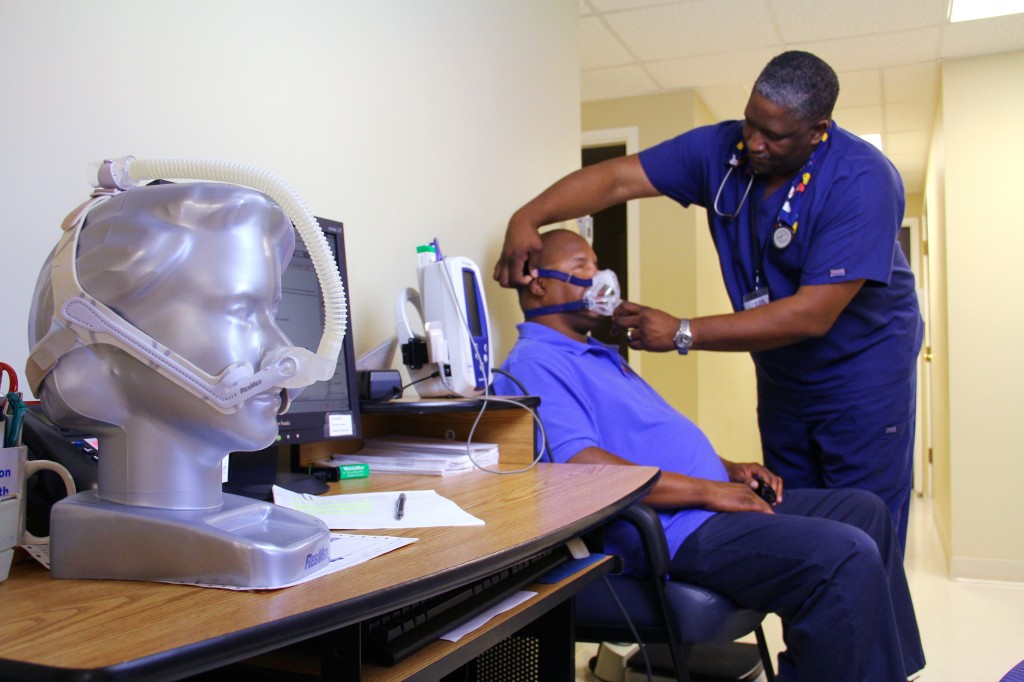 Many chronic sleep disorders are related to breathing difficulties. Lynchburg Pulmonary can help diagnose and treat many of the conditions that can contribute to insomnia (the inability to sleep regularly).
Many chronic sleep disorders are related to breathing difficulties. Lynchburg Pulmonary can help diagnose and treat many of the conditions that can contribute to insomnia (the inability to sleep regularly).
Understanding Sleep Hygiene
One of the most common causes of insomnia is “poor sleep hygiene,” the lack of a set of habits that encourage restful sleep. This is a particularly bad problem for people who have even mild cases of other conditions that might disturb sleep, such as sleep apnea. A number of simple steps can improve the quality of sleep dramatically, making sleep pleasurable once again.
Help your body’s clock operate in a regular fashion:
- Most people should avoid naps, except possibly for a brief 10–15 minute nap taken about 8 hours after you get up in the morning. In a few sleep disorders, naps may be beneficial; check with your physician.
- Limit the time you sleep to the average number of hours that you actually slept per night in a week that you studied this. Keeping a diary of sleep time may help you figure out how much time you need. Too much time in bed decreases the quality of sleep for the next few nights.
- Get some regular exercise. 30 or 40 minutes of an activity intense enough to cause sweating and hard breathing has tremendous benefit to sleep and health. Finish exercising 6 to 8 hours before bedtime.
- Raising your body temperature slightly within 2 hours of bedtime promotes sleep. Take a hot bath, or have a hot (non-alcoholic, caffeine free) beverage.
- Keep a regular bedtime and awakening time.
- Expose yourself to sunlight for 30 minutes within 30 minutes of arising.
- If you have to get up in the middle of the night, avoid bright light.
Avoid drugs that disturb sleep:
- Do not smoke to get yourself back to sleep.
- Do not smoke within 4 hours of bedtime. For that matter, give up smoking altogether!
- Try avoiding caffeine completely for 4 weeks. This often improves sleep dramatically.
- If you use caffeine, limit yourself to no more than 300 mg per day—that’s about 3 cups of coffee or 4 soft drinks. (It’s best not to use any caffeine after about 10 a.m. since it can be a stimulant for up to 14 hours.)
- Light use of alcohol is probably safe. Although alcohol can be relaxing, there is a stimulant effect that follows the relaxation period. For each drink you have, it is best to let an hour pass before bedtime. For example, if you go to bed at 11:00 p.m., and you drink 3 drinks at a party, you should have the last one no later than 8:00 p.m.
- Be aware that alcohol reduces the drive to breathe, particularly in men past late middle age and in women after menopause.
Reduce disturbances after sleep begins:
- Have a bedtime ritual. Reading before bed can be helpful, especially if the book is a subject you enjoy that you don’t have to think about a lot. Avoid doing things related to your work.
- Keep the face of your clock turned away from you. If you wake up at night, don’t try to find out what time it is.
- Keep your room dark, quiet, ventilated, and at a comfortable temperature. Avoid unfamiliar sleep environments if you can.
- Make sure your mattress and pillow are the right height and firmness.
- No pets in the bedroom.
- Use the bedroom only for sleep; don’t work, watch TV, exercise, talk on the phone, or do other things that may lead to prolonged arousal.
- Do not eat or drink much within 3 hours of bedtime, but a very light bedtime snack is relaxing for many people.
- If you have trouble with heartburn or regurgitation, avoid spices or heavy meals in the evening. Avoid any bedtime snack. Elevating the head of the bed may be very helpful.
- Before going to bed, make a list of one or two word reminders of the day’s problems and the plan you have developed to solve them. If you’re a “worrier,” this can make you feel like you’ve solved some things during the day.
- Learn relaxation techniques or self-hypnosis to use when you wake up in the middle of the night.
- Learn stress management skills to use during the daytime.
- If children or others must be cared for in the middle of the night, try to make arrangements that avoid disturbing sleep, or share the responsibilities with someone else.
- An occasional sleeping pill is probably okay, but they shouldn’t be used on an extended regular basis.
